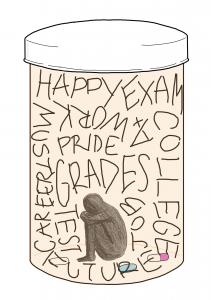Editorial
 We look down on heavy drug users. This scorn perpetuates the belief that drug users are inherently bad, dangerous people, that they are the other man, not us. But drug abuse could easily be the fate of any one of us.
We look down on heavy drug users. This scorn perpetuates the belief that drug users are inherently bad, dangerous people, that they are the other man, not us. But drug abuse could easily be the fate of any one of us.
This month, drug counselor for The Other Bar and former user David Mann spoke to Peninsula students about his destructive journey with addiction. Living in a privileged, affluent community, Peninsula students seem shielded from the influence of serious drugs. Nevertheless, Mann proved that this is far from true. Mann depicted his own life: a high school athlete, a 4.0 valedictorian, a quintessential high-achieving student. He even attended Stanford University for law school. In order to keep up with the rigor of his stressful lifestyle, he turned to drugs in college. He started with an ADHD medication called Black Beauty, then moved on to crystal meth and eventually became lost in the world of heroin.
Mann’s intent to be a successful student pursuing further education strongly resonates with high-achieving Peninsula students. Mann’s academic ambition became an obsession, such that he felt pressured to try anything to aid him. This is not uncommon among the educated, those under enormous academic and professional burdens; in fact, it is actually so prevalent among lawyers that Mann works to help attorneys struggling with substance abuse. The fact remains: drug abuse can potentially ensnare anyone, and the educated are definitely not exempt.
Mann ended his presentation with a piercing description of the months he spent on the streets, with no home and no job. He spoke solemnly of the night he spent sleeping underneath a playground slide to avoid the rain, waking up to the stare of a curious little girl. He heard the girl’s mother yell, “You come away from that man over there! You didn’t touch anything did you? You better go and wash your hands.”
It was this moment, and the realization of who he had become, that convinced Mann to sober up. His experience serves as an example of not only the preconceptions we have of drug users but also that these preconceptions can be wrong. The mother’s reaction is not uncommon. We look down on drug addicts, but rarely consider the circumstances behind them. In an atmosphere as rigorous as Peninsula’s, substance abuse may not be as far as we think. Though the obvious fix would be to avoid drugs altogether, it is important to keep in mind that users are more than their addiction. Instead, they are people who can be rehabilitated and helped.

